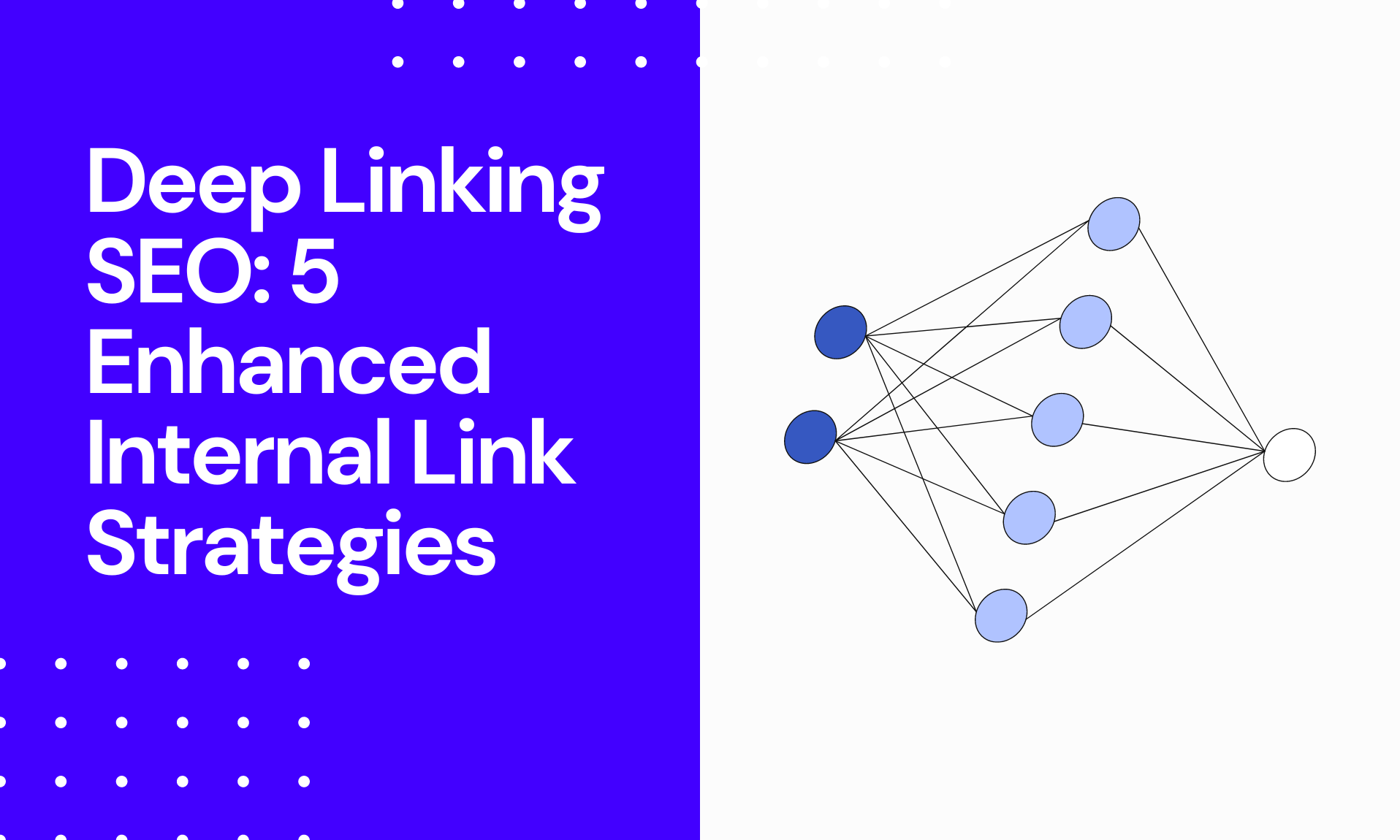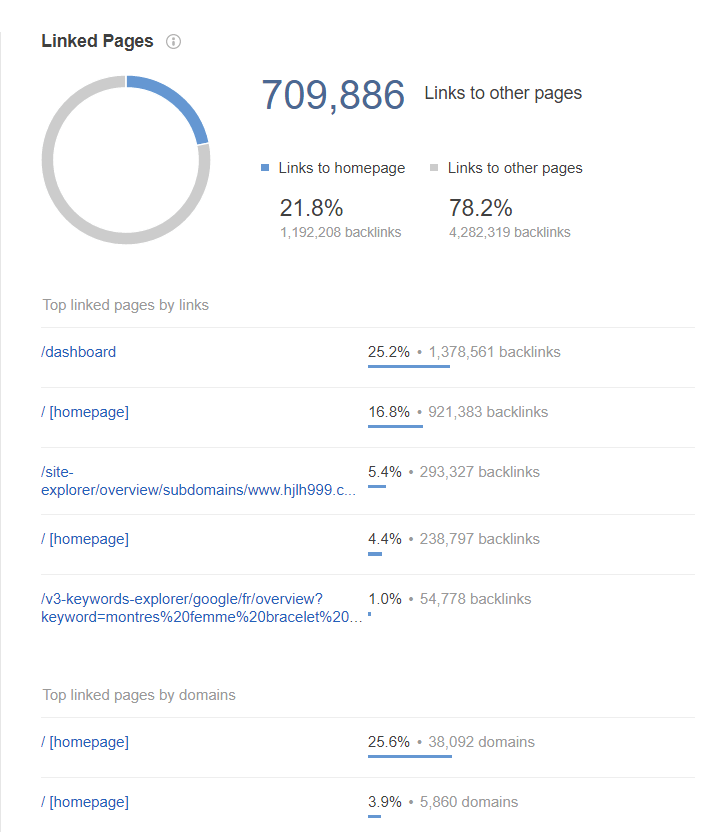Deep Linking SEO: The Secret Weapon For Boosting Your Website's Visibility
Deep linking SEO is one of those strategies that can make or break your website's performance. Imagine this: you're scrolling through social media or reading an article, and suddenly you find a link that takes you straight to the heart of what you're looking for. That's the power of deep linking. But it's not just about convenience; it's about enhancing user experience, improving engagement, and ultimately boosting your site's search engine rankings.
Now, I know what you're thinking. "Isn't all linking the same?" Well, not exactly. While surface-level linking points users to your homepage or main sections, deep linking dives deeper, directing them straight to specific pages that contain the exact information they're searching for. This not only makes navigation easier but also tells search engines that your site has valuable content worth ranking higher.
Think of deep linking as the secret sauce in your SEO recipe. When done right, it can significantly impact how search engines perceive your website's relevance and authority. And in the ever-evolving world of digital marketing, having a solid deep linking strategy can give you that competitive edge you've been looking for. So, let's dive in and explore how you can harness the power of deep linking to supercharge your SEO game.
What Exactly Is Deep Linking SEO?
Deep linking SEO refers to the practice of creating hyperlinks that direct users to specific pages within a website rather than just the homepage. It's all about guiding visitors straight to the content they're interested in, saving them time and effort. But why does this matter in the grand scheme of SEO?
When search engines crawl your site, they look for signals that indicate how valuable and relevant your content is. By implementing deep linking, you're essentially telling these bots, "Hey, this page has something special that people are looking for!" This increases the likelihood of your pages being indexed and ranked higher in search engine results.
Plus, deep linking encourages users to explore more of your site. If someone lands on a specific page and finds it useful, they're more likely to stick around and check out other pages. This reduces bounce rates and increases dwell time—two crucial factors that search engines take into account when determining rankings.
Why Deep Linking Is Crucial for Your SEO Strategy
Okay, so we've established what deep linking is, but why should you care? Let me break it down for you. First off, deep linking improves user experience. Think about it: if someone clicks on a link and lands exactly where they need to be, they're going to be happy campers. Happy users mean higher engagement, and higher engagement translates to better SEO performance.
Moreover, deep linking helps distribute link equity more effectively across your site. When external sites or even your own content link to specific pages, those pages gain authority. This authority then trickles down to your entire site, boosting its overall ranking potential. It's like giving your site a big ol' SEO boost from the inside out.
And let's not forget about content discoverability. With deep linking, you're making it easier for users to find your hidden gems—the pages that might not get as much traffic but are packed with valuable information. By shining a spotlight on these pages, you're increasing their chances of being noticed by both users and search engines.
How Deep Linking Works in Practice
Now that you understand the theory behind deep linking, let's talk about how it works in real life. When you create a deep link, you're essentially crafting a URL that points directly to a specific page or section within your website. For example, instead of linking to "www.example.com," you'd link to "www.example.com/blog/post-title." This ensures that users land exactly where you want them to be.
But it's not just about slapping together a URL. You need to make sure that the page you're linking to is optimized for both users and search engines. This means having clear, descriptive anchor text, relevant keywords, and high-quality content that adds value to the user's experience.
Here's a quick rundown of how deep linking works step by step:
- Identify the page you want to link to
- Craft a relevant and descriptive URL
- Use appropriate anchor text that matches the content of the page
- Ensure the page is optimized for search engines with proper meta tags and keywords
- Monitor the performance of the page using analytics tools
The Benefits of Deep Linking for SEO
So, what's in it for you? The benefits of deep linking SEO are numerous, and they go beyond just improving your rankings. Let's take a closer look at some of the key advantages:
Improved User Experience
As I mentioned earlier, deep linking enhances user experience by guiding visitors straight to the content they're looking for. This reduces frustration and increases satisfaction, which can lead to higher engagement rates and longer visits.
Increased Page Authority
When external sites link to your specific pages, those pages gain authority. This authority then spreads throughout your site, boosting its overall ranking potential. It's like a snowball effect—start small, and watch it grow bigger and bigger.
Better Content Discoverability
Deep linking makes it easier for users to find your hidden gems—the pages that might not get as much traffic but are packed with valuable information. By highlighting these pages, you're increasing their chances of being noticed by both users and search engines.
Best Practices for Deep Linking SEO
Now that you know why deep linking is important, let's talk about how to do it right. Here are some best practices to keep in mind:
Use Relevant Anchor Text
Your anchor text should accurately describe the content of the page you're linking to. Avoid using generic phrases like "click here" and instead opt for descriptive text that gives users an idea of what to expect.
Optimize Target Pages
Make sure the pages you're linking to are optimized for both users and search engines. This includes having clear meta tags, relevant keywords, and high-quality content that adds value to the user's experience.
Monitor Performance
Use analytics tools to track the performance of your deep links. This will help you identify which pages are performing well and which ones need improvement. It's all about continuous optimization and refinement.
Common Mistakes to Avoid in Deep Linking SEO
While deep linking can be a powerful tool, there are some common mistakes that can hinder its effectiveness. Here are a few to watch out for:
Overusing Deep Links
Just like with anything else in SEO, moderation is key. Don't go overboard with deep links; focus on linking to the most relevant and valuable pages. Too many links can dilute the authority of your site and make it harder for users to navigate.
Ignoring Broken Links
Nothing ruins the user experience like a broken link. Make sure to regularly check your site for any broken links and fix them promptly. This not only improves user experience but also helps maintain your site's authority in the eyes of search engines.
Not Optimizing Target Pages
Linking to a page that's not optimized is like pointing someone in the wrong direction. Make sure the pages you're linking to are fully optimized for both users and search engines. This includes having clear meta tags, relevant keywords, and high-quality content.
How to Measure the Success of Your Deep Linking Strategy
So, how do you know if your deep linking strategy is working? There are several metrics you can use to measure its success:
Page Views
Track the number of page views for the pages you've linked to. An increase in page views indicates that your deep links are driving traffic to the right places.
Bounce Rate
Monitor the bounce rate of the pages you've linked to. A decrease in bounce rate suggests that users are finding the content valuable and are sticking around longer.
Time on Page
Measure the amount of time users spend on the pages you've linked to. Longer dwell times indicate that users are engaged with the content and are finding it useful.
Advanced Techniques for Deep Linking SEO
If you're ready to take your deep linking strategy to the next level, here are some advanced techniques to consider:
Internal Linking
Linking to other pages within your site can help distribute authority and improve user experience. Make sure to use relevant anchor text and optimize the target pages for search engines.
Guest Blogging
Writing guest posts for other websites is a great way to earn backlinks to your specific pages. Just make sure the sites you're writing for are reputable and relevant to your niche.
Content Syndication
Sharing your content on other platforms can help increase its visibility and drive traffic to your specific pages. Be sure to include deep links in your syndicated content to guide users back to your site.
Conclusion
In conclusion, deep linking SEO is a powerful strategy that can significantly boost your website's visibility and performance. By guiding users straight to the content they're looking for, you're improving their experience, increasing engagement, and ultimately enhancing your site's authority in the eyes of search engines.
So, what are you waiting for? Start implementing deep linking into your SEO strategy today and watch your site soar to new heights. And don't forget to share your thoughts and experiences in the comments below. I'd love to hear how deep linking has impacted your site's performance!
Table of Contents
- What Exactly Is Deep Linking SEO?
- Why Deep Linking Is Crucial for Your SEO Strategy
- How Deep Linking Works in Practice
- The Benefits of Deep Linking for SEO
- Best Practices for Deep Linking SEO
- Common Mistakes to Avoid in Deep Linking SEO
- How to Measure the Success of Your Deep Linking Strategy
- Advanced Techniques for Deep Linking SEO
- Conclusion



Detail Author:
- Name : Miss Delphine Auer I
- Username : wklocko
- Email : hansen.helene@yahoo.com
- Birthdate : 2000-02-25
- Address : 767 Avery River Omertown, PA 51418
- Phone : +1-360-719-8852
- Company : Quitzon, Hudson and Quitzon
- Job : Nuclear Monitoring Technician
- Bio : Nulla qui quo numquam blanditiis reprehenderit sunt laudantium atque. Hic quis ut minima iste consequatur.
Socials
instagram:
- url : https://instagram.com/brekke1970
- username : brekke1970
- bio : Qui in laboriosam debitis. Fugit nisi doloribus quisquam libero. Ab omnis voluptate nihil est quia.
- followers : 3811
- following : 701
facebook:
- url : https://facebook.com/kirstin4743
- username : kirstin4743
- bio : Harum soluta id similique qui nihil officiis.
- followers : 3184
- following : 724
tiktok:
- url : https://tiktok.com/@kirstin_brekke
- username : kirstin_brekke
- bio : Expedita similique sed nulla inventore.
- followers : 1783
- following : 2202